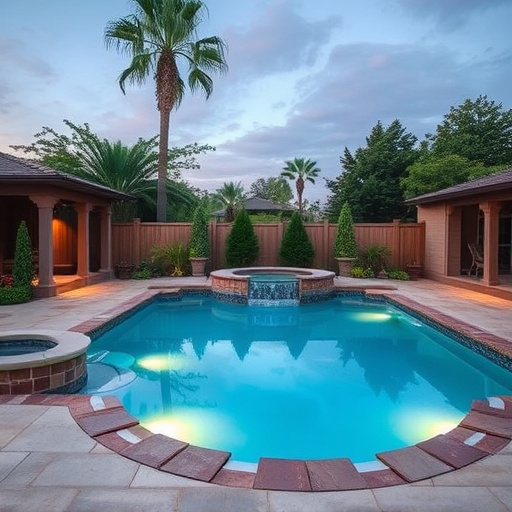Swimming pool alarms for inground pools are vital safety measures, offering immediate alerts via contact sensors or wave-detecting systems to prevent drowning and unauthorized access. These advanced systems provide remote monitoring, regular testing, and integration with home security, ensuring comprehensive protection tailored to specific needs. Installation involves placing sensors around the pool and connecting them to a control panel for monitoring. Regular maintenance and understanding of alarm operation ensure effectiveness, enhancing safety for pool owners and reducing risks associated with in-ground pools.
“Swimming pool alarms are essential safety measures for protecting inground pools, preventing accidental drowning, and ensuring peace of mind. This comprehensive guide explores the critical aspect of inground pool safety, delving into various types of swimming pool alarms available in the market. We’ll cover installation, maintenance, and the benefits of advanced systems, offering key insights to help you choose the right alarm for your pool.”
Understanding Inground Pool Safety: The Need for Alarms
Inground pools present unique safety challenges due to their depth and location within the ground. Understanding inground pool safety is paramount to ensure the well-being of users, especially children and unsupervised individuals. One of the critical components in enhancing this safety is the installation of swimming pool alarms. These devices serve as early warning systems, detecting potential hazards like unauthorized entry or accidental falls into the pool area.
Swimming pool alarms for inground pools are designed to sound alerts when sensing movement or activity within a specific range. This immediate notification enables swift action, allowing pool owners and nearby bystanders to take necessary precautions. By integrating these alarms as part of your pool safety measures, you create an extra layer of protection, ensuring peace of mind and significantly reducing the risk of accidents around inground pools.
Types of Swimming Pool Alarms: A Comprehensive Overview
Swimming pool alarms are an essential safety feature for any in-ground pool, providing an extra layer of protection against accidental drowning or unauthorized access. These devices are designed to detect potential hazards and alert pool owners or supervisors immediately. There are several types of swimming pool alarms available on the market, each with unique capabilities and technologies. From contact sensors to wave-detecting systems, these alarms cater to different needs and preferences.
Contact alarms, for instance, are installed along the pool’s edge, typically at the deck level, and interrupt an electrical circuit when a potential danger is detected, such as someone falling into the water or an unauthorized person attempting to gain access. In contrast, wave-detecting alarms use sensors that monitor water movement, activating an alarm if there’s no motion for a set period, indicating a potential drowning situation. Additionally, some advanced systems offer smart features like remote monitoring, automatic testing, and integration with home security systems, ensuring comprehensive protection for in-ground pools.
Installation and Maintenance of Inground Pool Alarms
The installation of swimming pool alarms for inground pools is a smart investment in safety, offering peace of mind for both pool owners and their loved ones. These devices are designed to detect unauthorized access or accidental entry into the pool area, activating an alarm to alert nearby individuals or authorities. The setup process typically involves placing sensors around the pool’s perimeter, ensuring they are securely fastened and connected to a control panel. This control panel acts as the brain of the system, monitoring sensor activity and triggering alarms when necessary.
Regular maintenance is key to keeping these systems effective. Battery checks and replacements, sensor cleaning to ensure optimal sensitivity, and testing the alarm functionality on a monthly basis are essential tasks. Pool owners should also familiarize themselves with the control panel’s operation, ensuring they can quickly arm and disarm the system as well as respond appropriately in an emergency situation. By combining professional installation, consistent maintenance, and user understanding, swimming pool alarms for inground pools provide an extra layer of safety, guarding against potential hazards and preventing unfortunate incidents.
Benefits of Advanced Pool Alarm Systems
Inground swimming pools, while offering a refreshing and enjoyable experience, also come with inherent risks. This is where advanced pool alarm systems step in as a crucial safety measure. These sophisticated devices are designed to detect potential hazards and alert homeowners or caretakers immediately, ensuring swift action in case of an emergency.
The benefits extend beyond basic security. Modern swimming pool alarms for inground pools often incorporate multiple sensors and advanced technologies like motion detection, impact sensors, and even water current monitoring. This multi-layered approach enhances overall safety, providing peace of mind for pool owners and reducing the risk of accidental drowning or unauthorized access. Additionally, these systems can be easily integrated into existing pool infrastructure, making them a practical and effective solution for protecting both residential and commercial inground pools.
Choosing the Right Swimming Pool Alarm: Key Factors to Consider
When selecting a swimming pool alarm for an in-ground pool, several key factors come into play. First and foremost, consider the type of alarm that best suits your needs—surface or submerged. Surface alarms are more visible and easier to maintain but may be less effective against determined intruders. Submerged alarms, on the other hand, offer discreet protection and can detect movement under the water’s surface. Additionally, think about the sensitivity and range of the alarm. A more sensitive alarm can detect smaller movements, ensuring an extra layer of safety, while longer ranges allow for better coverage around the pool.
The durability and weather resistance of the alarm are also essential considerations, especially if your pool is exposed to varying weather conditions. Look for alarms with water-resistant or waterproof casing to prevent damage from rain, snow, or direct sunlight. Moreover, check if the alarm comes with additional features like remote controls, automatic testing capabilities, or integration with smart home systems, which can enhance both convenience and safety monitoring.
